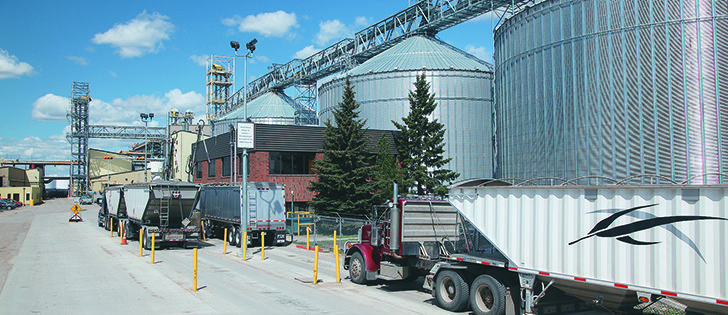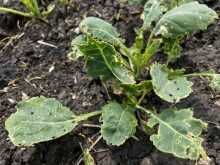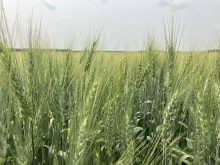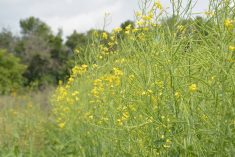ADM Agri-Industries expansion | Alberta facility allows growers to unload ‘ATM-style’
One of the largest canola crushing plants on the Prairies has streamlined its seed receiving capabilities and is poised to open the biggest biodiesel plant in Canada.
ADM Agri-Industries is putting the finishing touches on an expansion at its plant in Lloydminster, Alta., that will greatly reduce waiting times at the facility.
The company has nearly doubled its storage capacity with four new bins and has more than doubled its seed receiving capacity by adding a second line, moving to a scheduled delivery system and installing two seed kiosks.
Read Also

Farming Smarter receives financial boost from Alberta government for potato research
Farming Smarter near Lethbridge got a boost to its research equipment, thanks to the Alberta government’s increase in funding for research associations.
“All of it is geared to getting growers in, out and on their way so that they have a fast and predictable delivery experience,” said J.P. Montalvo, manager of the Lloydminster plant.
Wait times were unpredictable in the past, ranging from 1.5 to five hours, and frustrated growers were taking their business elsewhere. The expansion addresses those concerns in time for the 2013 harvest.
“What we want growers to expect is that they can get in and out in an hour,” said Montalvo.
Todd Hames, a canola grower from Marwayne, Alta., has firsthand experience with the old receiving line.
“I’ve rolled in there before when the trucks are parked out on the street and you don’t know how long you’re going to be there for,” he said.
“The farm delivery part (of the ADM plant) was one of the portions in dire need of some upgrades.”
Hames has delivered canola to the plant following some of the upgrades and noticed a marked improvement.
“Scheduling was a big change that helped us out a lot,” he said.
Hames lives 30 minutes from the plant and can now count on a two-hour roundtrip to deliver his canola.
“It certainly makes it more attractive to price canola in there if you know it won’t take you all month to deliver it,” he said.
ADM is installing two drive-through seed unloading kiosks. Growers and commercial carriers will be assigned tags that they will scan to identify themselves at delivery.
“The producer won’t have to get out of their trucks.” Montalvo said. “They’ll be able to basically pull up ATM-style.”
Drivers will be prompted to enter contract and payment information into a touch screen.
The tag will be scanned again in the unloading area to ensure the correct payment, weight and grade has been assigned to that load of canola.
The addition of four new storage bins will ensure ADM is able to accommodate canola being delivered straight off the combine.
Bunge, Cargill and Richardson have been adding crush capacity to their plants, but Montalvo said ADM’s approach is to “debottleneck” its facilities and increase throughput.
He wouldn’t divulge the plant’s capacity, but according to industry information it is about 1.4 million tonnes annually, making it the second biggest operation on the Prairies, next to Cargill’s plant in Clavet, Sask.
The company is also in the process of commissioning an adjacent biodiesel plant, which will have the capacity to produce 265 million litres a year.
It will be the biggest plant in Canada and require seed from 550,000 to 600,000 acres of canola.
“It does open up another market for western Canadian canola growers to be able to move their product into,” said Montalvo.
The biodiesel plant will provide a stable market in the heartland of Canadian canola production, one that is not subject to the whims and policy risks of international trade.
Hames, who is president of the Canadian Canola Growers Association, said a global-scale biodiesel plant has been a long time coming.
“That’s a big milestone to finally get. I mean, the whole world is producing biodiesel in big plants like this,” he said.
“It’s certainly exciting for all of Canada to finally be producing our own biodiesel in our own country to meet the mandates that the government has regulated.”
He said it will be nice to have the market pull for about 500,000 tonnes of canola in his own backyard.
“It’s a lot of canola and it’s a lot of acres and it’s great to be fulfilling the Canadian mandate.”
Montalvo said the plant will be global in scale and will compete in export markets as well as meet provincial and federal mandates in Canada.
“The capacity is actually greater than what the Prairies will consume, so we do have an opportunity to be an exporter as well,” he said.
Montalvo feels “very comfortable” that the plant will commence operations in the fourth quarter of 2013 as originally planned.


















